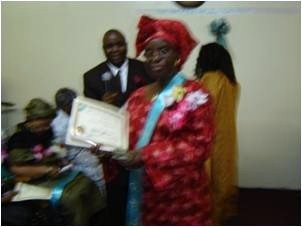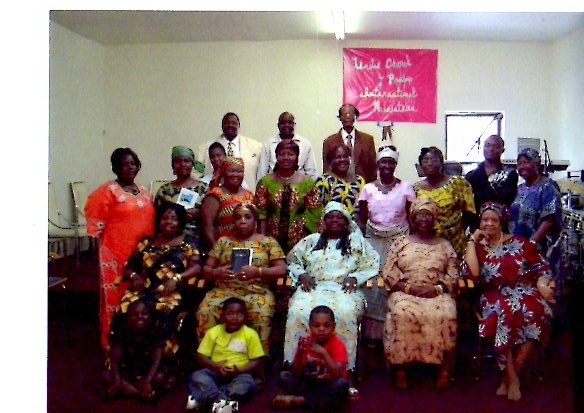 |
 |
United Church of Praise International Ministries, inc.: Deacon & Deaconesess.
Deacons: Kolubo C. Manneh
Deaconesses: Esther Glay / Nora Tucker and Madea Gonza
The meaning of the Greek word for "deacon" seems to make it distinct from elders and overseers in the type of work they do. The word signifies a servant or attendant such as one who would wait on tables. The biblical word for deacon seems to indicate that they take care of the physical issues in ministry whereas elders/overseers would tend more to the spirtual welfare of the flock. All, however, are to be held to a high standard in personal qualifications
(1 Tim. 3:1-13; Titus 1:5-9).
Though two distinct words, elders and overseers seem to be used for the same role in Acts 20:17, 28; Titus 1:5-9 and 1 Peter 5:1-2. The word for "elder" may refer more to the position which is one that deserves the dignity and respect as would be afforded someone older in age. The word for "overseer" may refer more to the function of a person in that position.
If"episkopos" is a distinct office, it would appear to be more in the scope or sphere of influence than in the type of work they do. Elders would attend to local bodies of believers whereas bishops or overseers would be broader in scope. Their appointment is no light matter. In Acts 20:28 the Apostle Paul tells them to watch over the flock "of which the Holy Spirit has made you overseers." The early church prayed and fasted over their appointment and after having identified God's choice, committed them to the Lord (Acts 14:23). One of the ways they could recognize God's choice was by examining their lives to make sure their level of maturity and morality matched the qualifications given in 1 Timothy 3 and Titus 1.
Elders/overseers are the ones Scripture specifically refers to as shepherds of the flock (1Pet. 5:1-2).
Different demoninations or groups may assign other names than these. Let's not, however, get causght up in labels but rather lets seek to make sure the work they are to be doing is getting done.
If the "presbuteros" (elders) are to do the work of overseeing (episkopos) in an optimal way, then they need to be freed up as much as possible of the more menial or physical aspects of ministry by "diokonos" (deacons).
Acts 6:1-7 provides the example of making sure food was distributed to widows. The twelve leaders said "It would not be right for us to neglect the ministry of the word of God in order to wait on tables." They chose seven men and said "We will turn this responsibility over to them and will give our attention to prayer and the ministry of the word." Though these seven men were not called deacons, they did a work that freed up the apostles to better shepherd the flock.
If elders are to properly shepherd the flock, they need to let go of some of their control over the administrative and every day decisions of the church. They must delegrate tasks to wise and faithful people and allow them to make decisions that affect their areas of responsibility. Too often control issues plague an elder board, keeping them from effective shepherding. Power and pride cannot be in the definition or ministry description of a biblical elder.
Be shepherds of God's flock that is under your care, serving as overseers--not because you must, but because you are willing, as God wants you to be; not greedy for money, but eager to serve; not lording it over those entrusted to you, but being examples to the flock. (1 Pet. 5:2-3)
A Network of Shepherds - Plurality of Elders:
Scripture clearly indicates the plurality of elders. Other than reference of the identity of some of the elders (i.e. 2John 1), you read of churches having elders (plural) not merely an eder. (See Acts 11:30; 14:23; 15:2, 4, 22, 23; 16:4; 20:17, 28; 21:18; Phil. 1:1; 1 Tim. 5:17; Titus 1:5; James 5:14; 1 Pet. 5:1-2.) Reference to individual elders does not mean they served alone. To suggest that is to put into Scripture something it does not say. Jesus Himself set the example in choosing twelve disciples who would be the church's first leaders. And, one of the priorities of the early church was the appointment of elders (plural) in each local church (Acts 14:23; Titus 1:5).
The Bible does not specify the reason for a plurality of elders. Perhaps this leadship base was to be a demonstration of the true essence of the church, showing how God can build unity out of diversity and how we are to be interdependent and not self-dependent or self-reliant. Throughout history God instituted programs or structures that served as patterns or types of greater realities. If this is part of God's intent in setting a precedence of a plurality of elders, woe to the elder board filled with dissension, division, and disharmony. 1 Peter 5:3 clearly states that elders are to serve by "being examples to the flock." Perhaps if elders better practiced "being like-minded, having the same love, being one in spirit and purpose," and doing "nothing out of selfish ambition or vain conceit" then the rest of the Body would live in that humility as well and not look out for their "own interests, but also to the interests of others" (Phil. 2:2-4).
Elders are Under the Chief Shepherd:
Remembering who the Chief Shepherd is to whom they are all responsible may be the safeguard for elders against pride and wanting their own ways. Remembering that both they as elders and everyone else in the Body will ultimately be accountable to the same mighty God, the Chief Shepherd, should engender some humility. Knowing that they as elders along with everyone else ultimately must take their problems or anxieties to the same God who cares for all, should help to level the plane. Read on in 1 Peter 5 to the verses following discussion about the responsibility of elders to shepherd the flock. You will see in those verses why elders must maintain humility as they serve the people. Verse eight warns that the enemy "prowls around like a roaring lion looking for someone to devour." What a playground for the enemy is a church whose elders misuse their positions. Elders must humble themselves under God's mighty hand. He is the Chief Shepherd. When it is about Him and not them, the enemy has no power.
Inspecting the Condition of the Flock:
The word for oversee, which is what an elder is to do, brings with it the idea of carefully looking upon or inspecting. Shepherding the flock therefore requires elders to know the condition of the flock. Acts 20:28-31 suggests the particular role elders are to have in this aspect of shepherding. After telling them to shepherd the flock, the Apostle Paul said that "savage wolves will come in among you and will not spare the flock. Even from your own number men will arise and distort the truth in order to draw disciples after them. So be on your guard!"
Elders are guardians of the truth among the flock. They must protect the flock from false doctrine. Part of that comes in teaching correct doctrine so people themselves can identity error. Is it any wonder that one of the qualifications for being an elder/overseer is to "be able to teach" (1 Tim. 3:2)? Also, "he must hold firmly to the trustworthy message as it has been taught, so that he can encourge others by sound doctrine and refute those who oppose it" (Titus 1:9). As Acts 20:28 says, they must "keep watch" over themselves "and all the flock." What goes for the flock, goes for the elders too.
Elders' Ministry Description:
While the ministry description for elders is similar to that of any shepherd, elders are unique in that they oversee the welfare of the entire church body. Thus, they will not be able to consistently involve themselves in the details of everyday ministry to each individual within the body. They must delegate that to others. They must guard themselves to their unique responsibilities.
While some churches will assign each elder to a certain group of people within the church to be their shepherd, the reality is that unless the church is very small, they still cannot effectively shepherd a group of peple on their own and tend to the big picture as well. The benefit of dividing the congregation among the elders seems to be that with the smaller sphere of contact, the elders will be able to better "inspect" or carefully watch those under their care and therefore gain a better assessment of the condition of the flock when all elders come together. If assigning members of the body to elders, they need to make sure the body understands the purpose. People must understand that the elder will not necessarily be the one to meet their needs but that they will be in a better position to implement plans to help assure that needs are met.
The elders must seriously oversee the bigger picture of what is happening in the church. They must:
protect the body from error
promote a Christ-centered environment
provide equipping and encouragement
prove to be good examples
| Site Map |